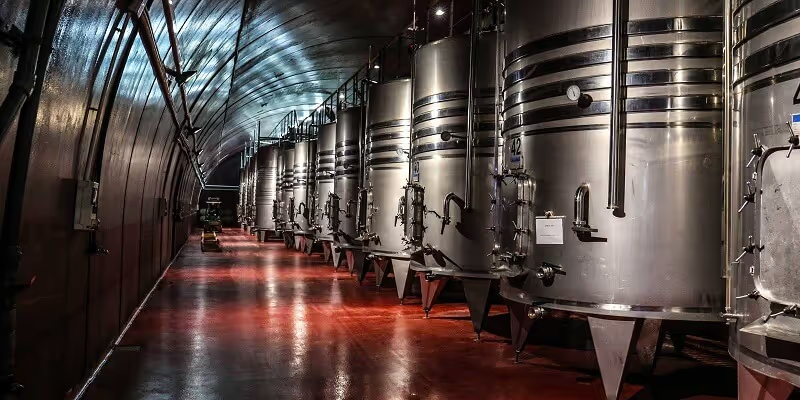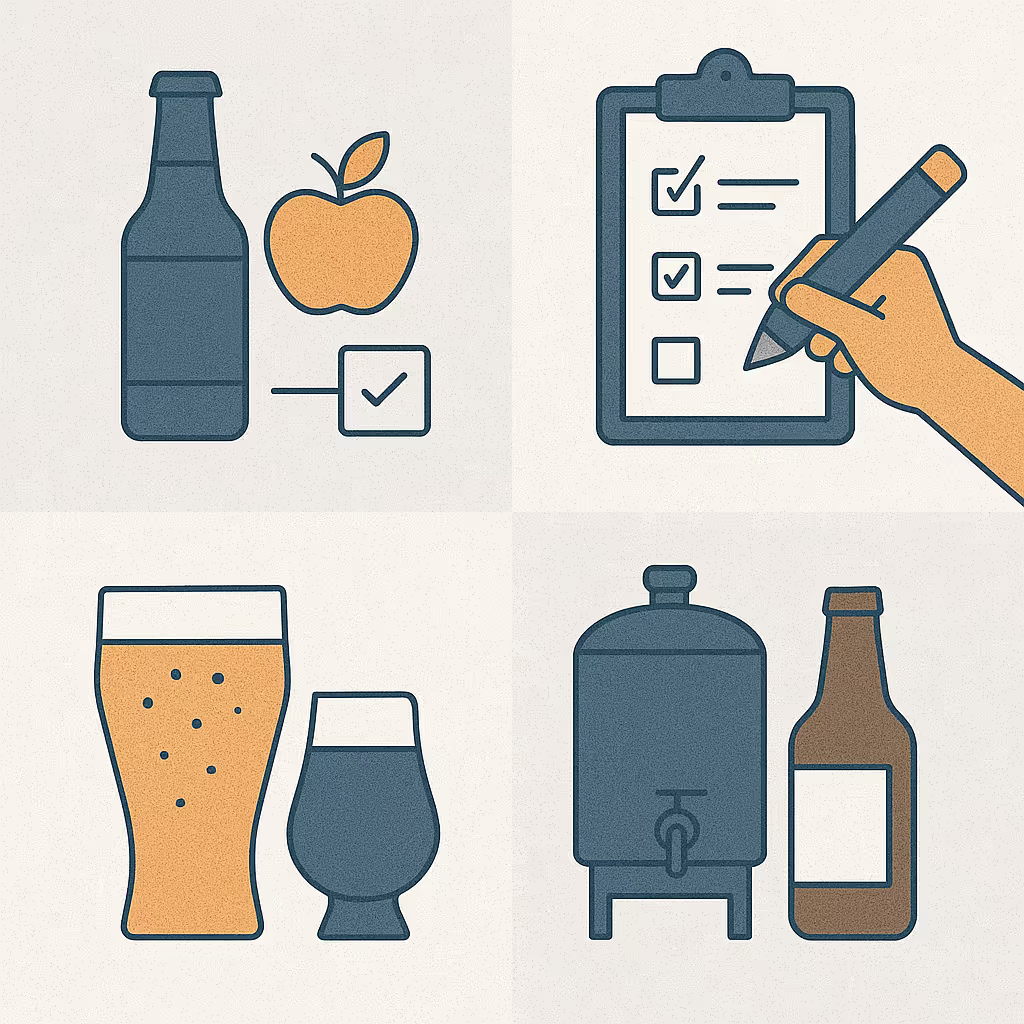Harness innovation in brewing and cidermaking to unlock tax savings. Craft breweries and cideries across the U.S. are pushing boundaries—experimenting with new yeast strains, novel fruit blends, advanced packaging systems and carbon‑reduction processes. Many of these efforts qualify for the federal R&D Tax Credit under IRC §41, and you may also be eligible for state‑level R&D incentives.


Examples of qualifying activities in craft breweries & cideries
- New Beer or Cider Formulation Testing unconventional hops, barrel ageing, locally‑sourced fruit blends, or cider apple varietals to achieve unique flavour profiles
- Fermentation & Yeast Innovation Trialing alternative yeast strains, mixed‑culture fermentations, temperature/time profiles, or co‑fermentation of cider with beer mash for hybrid styles
- Bottling, Canning & Packaging Enhancements Designing and testing improved canning lines to reduce oxygen ingress, enhance shelf life, reduce flavour loss, or prototype new packaging formats (crowlers, small‑batch kegs)
- Stability, Shelf Life & Quality Assurance Running shelf‑life trials under different conditions; monitoring flavour, clarity, carbonation retention over time; piloting new preservatives or natural clarifiers
- Sustainability & Waste‑Reduction Projects Experimenting with spent‑grain reuse in cider mash, water‑recapture systems in brewing, CO₂ recovery systems, testing compostable packaging, energy‑efficient chillers or fermentation cooling systems
- Scale‑up & Production Process Optimisation Moving from micro‑batch to commercial production: testing how pilot batches behave at 5 bbl, 10 bbl or larger scale, refining process control software, automation in keg or can lines
What qualifies as R&D in craft brewing & cidermaking?

To qualify, your activities must:
- Pursue a permitted purpose such as a new or improved beer, cider or process (for example, a novel fruit‑infused cider, a reduced‑alcohol beer, or an improved bottling method)
- Address technical uncertainty about how to achieve the desired flavour, stability, shelf‑life or packaging outcome
- Follow a process of experimentation—such as pilot batches, sensory testing, fermentation parameter trials or packaging line trials
- Be technological in nature, grounded in biology (yeast/fermentation), chemistry (flavour/stability), engineering (equipment/packaging) or materials science (labels/coatings)
Qualified Research Expenses (QREs)
The IRS allows several categories of Qualified Research Expenses (QREs):
Roles commonly involved in qualifying activities
- Masterbrewers, assistant brewers or cider makers leading formulation trials
- Fermentation scientists or microbiologists developing yeast/fermentation strategies
- Packaging engineers working on bottling/canning automation or new formats
- Quality control/assurance technicians conducting shelf‑life, stability or clarity tests
- Sustainability or process improvement leads working on waste reduction, energy efficiency or scale‑up
- Research partners or external consultants performing pilot trials
What does not qualify
- Routine production of beer or cider following a fixed recipe without experimentation
- General marketing, branding or packaging design for aesthetic purposes (if not tied to technical experimentation)
- Applying a proven process at larger scale without testing or improvement (i.e., scale‑up alone does not qualify unless there’s experimentation)
- Land acquisition, routine equipment installation or normal maintenance without R&D purpose
Compliance and Documentation
Following the One Big Beautiful Bill Act (OBBBA) signed July 4, 2025, §174 now allows immediate expensing of domestic research expenses for tax years beginning on or after January 1, 2025. Taxpayers may also elect optional amortization under new §174A. Foreign research expenses must still be amortized over 15 years. This is separate from the §41 credit but impacts overall tax planning.
With recent changes (such as the One Big Beautiful Bill Act) and changes to §174, it’s critical to document your R&D activities thoroughly. Documentation should include:
- Trial batch plans, hypotheses, variations in ingredients, fermentation or packaging parameters
- Batch logs: ingredient list, yeast/strain variations, temperature/time records, yield, sensory results, clarity/carbonation metrics
- Equipment logs, packaging line test runs, data on oxygen levels, shelf‑life results, sensory alterations
- Employee time allocation records: time spent on experimental batches vs routine production
- Supplier/contractor invoices for trial materials, consultant reports, software usage logs
Frequently Asked Questions
Yes. Many craft and small‑batch brewers and cider producers innovate with new recipes, fermentation/yeast techniques, packaging formats and sustainable operations—and these can qualify under the R&D tax credit rules.
Wages of staff involved in experimental activities; supplies used in testing new formulations or equipment; software used in modelling or controlling processes; and a portion of contractor expenses for external trial work.
Eligibility is not limited by size. Whether you’re a nano or micro‑brewery, a regional craft producer or a cider‑house conducting bona fide experimentation in process, product, packaging or sustainability you may qualify.
Standard recipe production without variation; routine tasting room operations; marketing campaigns; routine packaging without testing; applying fully proven methods without experimentation.
Savings vary depending on size, number of trials, level of experimentation and documentation. Industry benchmarks suggest that beverage manufacturers may raise tax credits for roughly ~18% of their R&D‑related costs. Even smaller operations conducting a handful of development batches may realise thousands of dollars in credits.
Keep detailed records of trial designs, batch logs, sensory/stability results, equipment logs, time sheet allocations, ingredient logs and process variations. These records support your claim under the IRS four‑part test (permitted purpose, technical uncertainty, experimentation, technological in nature).
Next Steps
Use our calculator to estimate your potential federal and state benefits
Schedule a consultation to structure your row crop research activities
If you are innovating in agriculture, you may already be doing R&D. Let's make sure you are rewarded for it.
Contact Strike Tax Advisory
Ready to maximize your R&D tax credits? Get in touch with our team of experts.

Alcoholic Beverages
With just a little info, our Strike Experts can help you start your R&D tax credit journey.
Got questions?
We’ll walk you through our process and take the time to understand yours to make sure you get the most back.
Schedule a MeetingRelated Sub-Industries
Does your state qualify for the State R&D Tax Credit?
Benefits for the R&D Tax Credit vary from state to state. Get an accurate estimate of your potential state tax credit!






